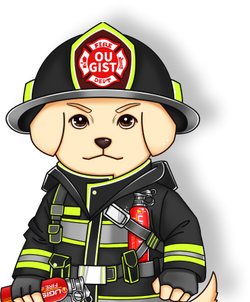Fire safety is a universal concern, whether you're safeguarding your home or your business. While the concept of fire extinguishers remains consistent across residential and commercial settings, there are key differences that arise due to the unique demands of each environment. In this blog post, we'll delve into the distinctions between commercial and residential fire extinguishers, helping you understand why tailored choices are crucial for effective fire prevention.

Design and Capacity
Residential Fire Extinguishers: Residential fire extinguishers are designed with simplicity in mind. They are usually smaller, lighter, and more straightforward to operate, making them suitable for homeowners who may not have extensive firefighting training. Residential extinguishers often come in multipurpose options, capable of tackling common fire types found in homes, such as those involving wood, paper, and flammable liquids.
Commercial Fire Extinguishers: Commercial fire extinguishers are typically larger and more robust, reflecting the complex fire risks associated with various industries. They come in a diverse range of types, tailored to specific fire classes common in commercial spaces, including flammable liquids, electrical fires, and specialized combustibles like metals and cooking oils.

Fire Hazards and Classes
Residential Fire Extinguishers: Residential fire hazards primarily revolve around everyday materials like cooking oils, paper, wood, and fabrics. As a result, residential extinguishers are often categorized as multipurpose ABC extinguishers, designed to combat common fire classes: A, B, and C.
Commercial Fire Extinguishers: Commercial spaces host diverse fire hazards that extend beyond common residential materials. Depending on the industry, fires involving industrial chemicals, electrical equipment, and specialized fuels can occur. Commercial fire extinguishers are designed to target specific fire classes, ensuring optimal effectiveness in various scenarios.
Regulations and Compliance
Residential Fire Extinguishers: Residential fire safety regulations tend to be less stringent compared to commercial settings. There might not be explicit requirements for fire extinguisher placement or specific types, but having a residential extinguisher in a visible and accessible location is advisable.
Commercial Fire Extinguishers: Commercial spaces are subject to more rigorous fire safety regulations due to higher occupant loads and the potential for larger and more complex fire risks. Businesses are often mandated to have a designated number of fire extinguishers of various types, and their placement must adhere to strict guidelines to ensure optimal coverage.
Training and Maintenance
Residential Fire Extinguishers: Residential users might not have extensive training in fire extinguisher usage. Therefore, residential extinguishers are designed for ease of use and often come with straightforward instructions.
Commercial Fire Extinguishers: Employees in commercial spaces typically receive training on fire safety protocols, including proper fire extinguisher operation. Regular maintenance checks and inspections are more critical for commercial extinguishers due to their larger size and the potentially higher frequency of use.



1 comment
I’m glad you clarified that multipurpose household extinguishers are a common option. As you indicated, this included addressing typical home fire types, like those involving wood, paper, and combustible liquid. I’ll make sure to let my spouse know about this because I believe purchasing one would be a smart option for our house. I’ll also look into services that might facilitate our purchase.
https://www.nwfireinc.com/vancouver-fire-extinguishers